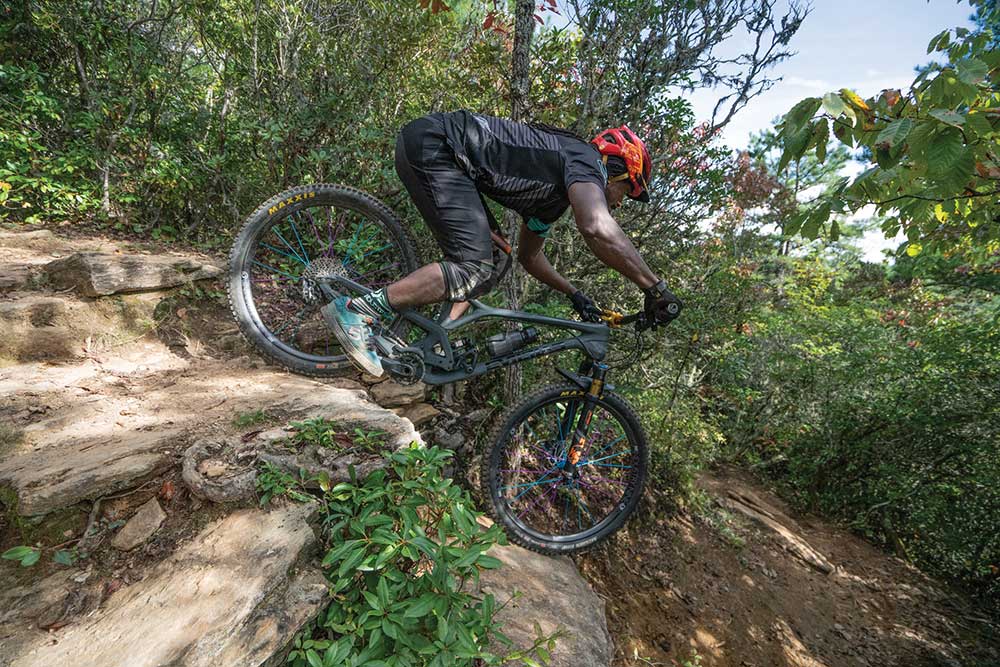Trey Thomas rides Bennett Gap in Pisgah National / photo by Joe Hoeper
Industry Nine’s long and winding path to success
When Clint Spiegel graduated college and returned to Asheville to work in his family’s Turnamics, Inc. machine shop, the facility was ramping up production for mountain bike suspension company RockShox. In a few short years, Rockshox relocated to California and moved production overseas. It was a crippling blow in an industry where work was slowly drying up. Unable to compete with the low labor costs of international manufacturing, the future of Turnamics was looking grim.
In an effort to remain afloat, Spiegel took on a contract with local component manufacturer Cane Creek. In addition to high-end bike headsets and suspension products, Cane Creek was looking to produce its own line of hubs, which transfer power from the rider to the rear wheel by engaging a drive ring mechanism when the pedals turn. Hubs are a complex part that must be built to withstand the forces produced by the strongest riders, with the durability to take years of battering on a mountain bike. It was a tall order.
Spiegel reminisces about the gamble, admitting that “They didn’t have money to pay me, but it would be my design and they would be the marketer. I spent a couple years and a quarter-million dollars trying to develop a hub. Ultimately, I couldn’t make it light enough and strong enough, so they dropped the project.”
Over the years, Spiegel produced parts for everything from nuclear submarines to medical devices to aircraft landing gear, but the humble bike hub had him stumped, and the design was shelved for a decade.
Even during the boom in Turnamics manufacturing brought on by the bike industry, Spiegel had never been a biker. His primary outlet for recreation was whitewater kayaking, but the realities of a growing family and a demanding job had pushed him into a phase that many kayakers experience. Risk tolerance and free time begin to wane, and the aging kayaker starts to see the appeal of land-based alternatives. “Having kids made me realize that risking my life kayaking probably wasn’t the smartest thing. I also needed something that would get me in shape with less of a time commitment, so I started riding.”
Of course, riding brought Spiegel face-to-face with his old nemesis – the hub project. “Every time I rode, I started thinking about those old designs and how they kicked my ass.” Those rides led to new ideas, and he would stay in the machine shop late at the night and emerge the next morning with prototypes ready to run. “When I finally came up with good stuff, I decided to launch the company.”

The Beginning of a Legacy
As a tip of the hat to the eight mostly failed ventures that came before, Spiegel named his new wheel company Industry Nine – i9 for short. I9’s first hub was called the Legacy, and while it gained a niche following, there was room for improvement. Besides excessive weight and drag, the bearings in the hub tended to wear out early and cause annoying creaking noises. The team went back to the drawing board.
The next iteration was called the Torch, and the vast improvements in every category garnered immediate attention from mountain bikers around the country. Thanks to some innovative engineering, turning the cranks just three degrees would allow the hub to engage the rear wheel. At a time when most hubs required 15 degrees of pedaling to reach engagement, it was a standout that managed to keep weight and drag to a minimum without sacrificing durability. The Torch hub also generated a literal buzz. While coasting, the sound of each of the six pawls engaging with the drive ring produced a signature sound that’s been likened to a swarm of angry bees.
Since the Torch, i9 has continued to reinvent the bike wheel with eye-catching anodization, high-strength straight-pull spokes, and a breakthrough new hub called the Hydra. Today, the multimillion-dollar company occupies a building next to the revitalized Turnamics machine shop, employing 45 people and utilizing about 60 percent of the manufacturing capacity of Turnamics’ additional 45-person staff. Bike culture at i9 is ubiquitous. The manufacturing floor is covered in employee rides, from the burliest enduro rigs to gravel grinders and single speeds. There’s even a pump track behind the shop for lunch breaks, and it’s seen more than a few backflips.
No matter how good things get, they’re never good enough for Spiegel and his engineers. “I play around with new ideas constantly. Test them out, see the strengths and weaknesses, refine them. We’re always working toward the next thing.” With advanced manufacturing capabilities onsite, the innovation produced at i9 is likely to continue. “Because we manufacture everything here, when we do have a new idea, we can pretty much immediately make prototypes and start testing them rather than waiting. No matter what we’re making, we’ll go through tons of iterations before we reach the final product.”
Spiegel’s manufacturing company itself went through plenty of iterations, but his persistence paid off. The evidence isn’t just in Asheville. Trails around the world are buzzing with the sound of i9 hubs, and every trailhead parking lot features wheels in a kaleidoscope of colors. For at least one determined entrepreneur, the ninth time is the charm.
Updated on October 15:
A previous version of this story incorrectly stated that Cane Creek was an offshoot of RockShox. Cane Creek actually began as Japanese component manufacturer DiaCompe (a founding partner of RockShox) before a name change in 1992 and transition to employee ownership some years later. The company has been operating out of its Western North Carolina facility since 1974.







